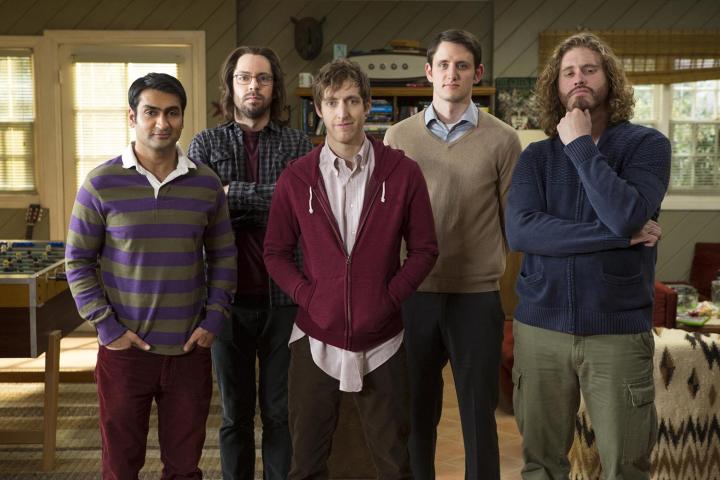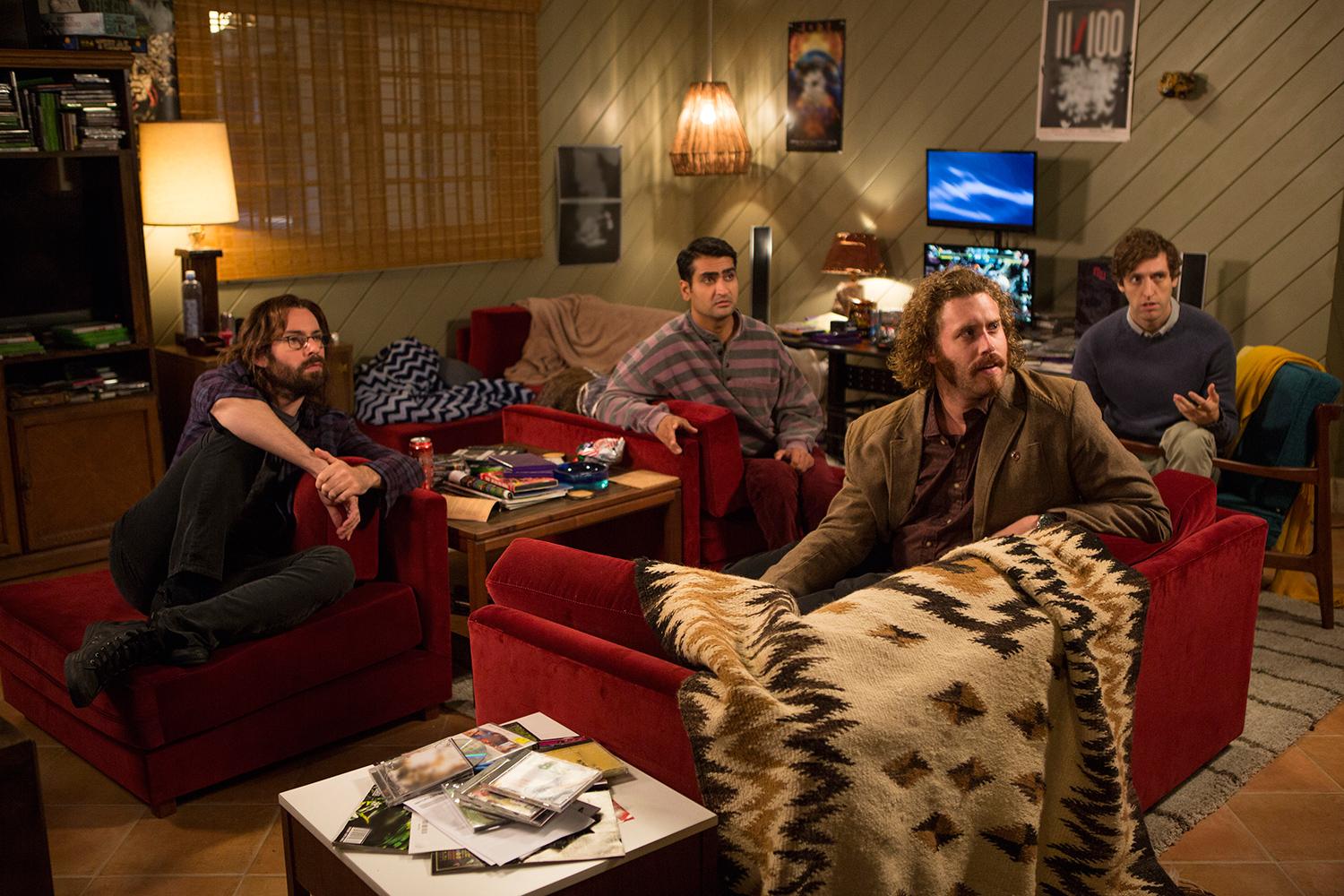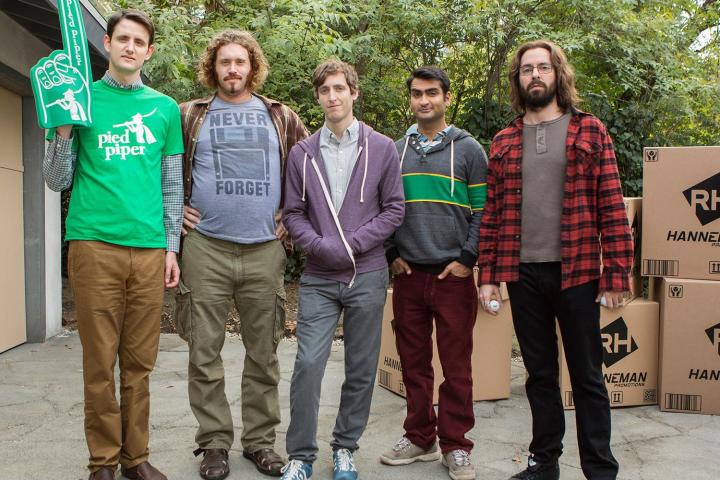
“We just happened to show the weirdness of that world at the same time that world was outing itself as being a bit off.”
When it comes to navigating all the ins, outs, and complex tip-to-tip efficiencies of Silicon Valley, HBO’s Silicon Valley is spot-on. “Most of Silicon Valley seems to appreciate the effort that we’re putting into getting the details right,” observes Martin Starr, who plays Bertram Gilfoyle, the droll Satanist-cum-programmer who will be the first to tell you he’s unmatched in terms of handling system architecture, networking, and security for Pied Piper, the music-app startup with the lightning-fast data-compression algorithm that sparks a major bidding war.
The eight-episode first season in now available on Blu-ray, DVD, and digital formats, and the 10-episode Season 2 gets underway this Sunday, April 12. “We continue to watch as this startup hits more speed bumps and the collective group tries to handle everything — which, oftentimes, is not very well,” reports Starr.
Starr called Digital Trends during a lunch break while shooting an episode of Comedy Central’s Drunk History to discuss Gilfoyle’s follies, the fine line between being labeled a geek or a nerd, and the possibility of the return of Party Down. It’s really all about making the world a better place.
Digital Trends: Pied Piper presents its app during a startup battle at TechCrunch Disrupt. Have you ever attended a tech trade show yourself?
“I think if I had been born five years later, I’d really know how to work a computer in that way.”
Martin Starr: No, and I still haven’t technically been to one because, well… I’m an actor. (both laugh) A lot of the people there were with their own actual companies, so it was as real as an actual convention as you could get without it actually being it.
[Silicon Valley co-creator] Mike Judge was talking in one of the Blu-ray extras how just about any combination of letters and words has been taken, so coming up with some of the fake company names was a big hassle.
Yeah. It’s also why it was much easier approaching companies that wanted to get their names out there, so that we didn’t have to deal with the issue of clearing names and stuff.
How does it feel being, as Hooli CEO Gavin Belson [Matt Ross] puts it, the member of the programming group described as “Some guy with crazy facial hair”?
(chuckles) I mean, every show needs one of those!
How computer savvy are you? A lot of the terminology Gilfoyle uses gets pretty technical.
I learned as we went along. We had a tech consultant there, so anything I didn’t understand, he helped me and everyone else with. I wasn’t ever a programmer, so I wasn’t familiar with all of those details. But I am fairly tech-aware, just not to the level that these guys are. It’s a whole new breed. I think if I had been born five years later, I’d really know how to work a computer in that way. I mean, I grew up with DOS and Windows.

Oh yeah, I started with FORTRAN and BASIC, and I still have the original Macintosh Plus I got back in 1986. Now you need an app just to translate it all. How was Silicon Valley able to capture the zeitgeist so well?
In Season 1, we embodied, just by sheer luck, what was happening in the news. We showed some of these guys who have apps acting a bit ridiculous in the public eye. This stuff just happened serendipitously around the same time and made it seem like it was premeditated or planned, but we had shot all of it prior. We just happened to show the weirdness of that world at the same time that world was outing itself as being a bit, you know, off.
It’s interesting, though. I wouldn’t know as much as I get told about that world when I meet random people. I’m always surprised. I was sitting at a Starbucks a couple of weeks ago, and a French guy walked by and asked me if I would take a picture. I thought he meant of him and his wife. “Nope, with you! We have an app. We came down from San Francisco.” “Oh, sure!” He works in Silicon Valley. I’ve met so many people who have some part in app development and a part in that whole tech industry. It seems to be the forefront of job creation at this point.
Did anybody try to sell you an app to get on the show?
No, though T.J. [Miller, who plays entrepreneur Erlich Bachman] has been offered an opportunity to be an investor, by nature of his being one on the show.
If Gilfoyle went off on his own to create his own app, what would it be?
“The collective group tries to handle everything — which, oftentimes, is not very well.”
I feel at his core, he’d be better mapping out the insides of the guts of the app. He’s less of an idea man and more of an executioner. He’ll make it up to code. I feel like they had an app idea for him, but I don’t think we ever let it out on Season 1.
That’s right, I think Bachman said you and Dinesh [played by Kumali Nanjiani] put your apps on hold to work for Pied Piper, but we never heard more about them. Maybe yours had something to do with the upside-down cross on Gilfoyle’s arm — or the right-side-up cross, I mean, depending on how you’re looking at it.
That would probably be the icon on the phone, yeah.
Is there anything you’re allowed to say about Season 2? Can you tease us?
The whole show picks up right where it left off. We continue to watch as this startup hits more speed bumps and the collective group tries to handle everything — which, oftentimes, is not very well. (both laugh)
I can’t really tell you major plot points or the guest stars who haven’t been announced yet. These are people who are very influential in that world, who may have made some of the apps that are at the forefront of social media and those kinds of things. People have to point out to me who they are, though. All of those people are very intrigued by the show and the way it represents them. Actually, most of Silicon Valley seems to appreciate the effort that we’re putting into getting the details right.
The background that Mike Judge has from being a programmer in Silicon Valley himself in the late ’80s must help.
It definitely does. That whole dick joke thing [in Episode 8 of Season 1, Optimal Tip-to-Tip Efficiency] — down to its core, is based out of fact. We met the guys who came up with it on set, which was pretty cool.
That was an instant classic scene and an iconic mathematical model — and it should be its own app, come to think of it.
The Dick Map App, yes.
There’s a classic nerd vs. geek argument that shows up in the Blu-ray extras, and Gilfoyle gets classified as a geek. Do you agree with that assessment?
I don’t really know how defined those distinctions are in my own mind. I feel like I “geek out” on a lot of things, but “nerd” is something else. It became a point of pride in the ’80s with Revenge of the Nerds and all those movies — the underdog story, which in some respect, is us.
But at what point do those definitions and judgments get wiped away because that’s the direction society is moving, and everybody has to be aware of technology, just to keep up? At least in America. Our whole society is moving toward more technology being ingrained in everyday things and everything that we do.
When you were growing up, did you feel that way, being a geek or a nerd? [As a kid, Starr played uber-geek Bill Haverchuck on the legendary Freaks and Geeks.]
“Our whole society is moving toward more technology being ingrained in everyday things and everything that we do.”
Oh yeah. I had a subscription to The Amazing Spider-Man. I got those every month until I decided I didn’t want to read them anymore because they were too valuable to open. When I started saving them and putting them in the plastic sheets, that’s when I became a nerd.
I was an only child growing up, so I spent a lot of time by myself, playing with my toys. I had my good buddy James, and we used to go out and ride our bikes, but a lot of my time was spent alone and in my own imagination, which has probably served me well as an actor.
The Pied Piper programming team was initially working on a music app. What kind of music did you grow up listening to?
I grew up in L.A., so I’m big into hip-hop. I actually rap with a bluegrass band called Martin Starr & Common Rotation, and we cover a lot of songs and mess around with them.
Wow, very cool. And you had Flo Rida on the show doing his thing at Peter Gregory’s toga party [in Episode 4, Fiduciary Duties].
Oh yeah! That was interesting. It’s fun to meet people from totally different worlds, like Kid Rock, a friend of Mike’s, who appeared in the very first episode [Minimum Viable Product]. People from a totally different world come into this world, and it’s funny. We have trailers based on our contracts and stuff, but he had a totally different contract based on how he performs live. We were at this house, and he had a whole floor of it. The top floor was for him, his dancers, and his people, with a big master bedroom. And me, Thomas [Middlemarch, who plays Pied Piper founder Richard Hendriks], Kumal [Nanjiani; programmer Dinesh Chugtai], T.J. [Miller; entrepreneur Erlich Bachman] and Zach [Woods; hapless exec Donald “Jared” Dunn] were all in a garage. (chuckles) They put us in the back in this garage. And it was rather cold.

What was the first music or album you really got into?
The first album I ever bought with my own money was Tupac, All Eyez on Me (1996), with, you know, California Love on it. That was a big part of my childhood. It made sense for me to listen to it then because of the people I was around and the culture I was in.
When I got older, around 15 or 16, I started writing poetry and doing open-mike poetry and slam poetry, that kind of stuff. And then I found these guys [Common Rotation] six or seven years ago, and we started doing music. We just have fun, and I really like it. I’m sure we’ll release something at some point. They’re all touring musicians, so getting their schedules together with mine is often very difficult.
How do you listen to music these days?
Recently, I started to listen more to Spotify. In the late ’90s and early 2000s, I put so much energy into putting CDs and MP3s on my computer. But then I got bored with that process, so I haven’t updated that library of music. And instead of carrying a whole library of music with you, you can stream it so much easier anyway. About 80 percent of the music you want is on Spotify.
How great is it being on a show that’s on HBO?
“Most of Silicon Valley seems to appreciate the effort that we’re putting into getting the details right.”
It’s so cool to be on a network that I hold such a high esteem for. I mean, The Sopranos … HBO has such a history. When they show the different still frames of the shows that are on the network and I see our group up there, I’m filled with pride to be a part of it.
In a sense, you were pre-approved as soon as we knew Silicon Valley was going to be on HBO. There’s a certain level of quality expected. No pressure on you, by the way.
(chuckles) I don’t feel any pressure. Certainly going into Season 2, it was to do something as good as, or hopefully better than, the way we climaxed the first season.
Here’s a scenario for you: If Gilfoyle met Sam Stern, your tech-expert character from NTSF:SD:SUV::, how would that meeting go?
It’s so hard to imagine a world where that meeting would ever happen! (chuckles) Those are such totally different worlds. But I would have loved for NTSF to have kept going. I really enjoyed that show. I’m surprised that you referenced it.
Oh, I always loved it on Adult Swim. You and Paul [Scheer, NTSF creator] have backgrounds in improv. How much of NTSF was scripted, and how much did you do your own thing?
NTSF was pretty well-scripted, but we would play with beats here and there. When Karen [Gillian] came on in the last year [Season 3], she was really fun to improvise with. It was a new dynamic. As a whole, that show was really like going to summer camp — a month in January, going off with your buddies.
And I didn’t really know Paul that well until we started working on NTSF, and then he turned out to be every bit the great guy I thought he was before. We had only hung here or there at parties.
Sam had a bit of a different look each time the show came back. Was that deliberate?
Oh yeah, totally. Form square one. I pitched an idea that I was steampunk, which was such an extreme thing. There’s always that one extreme person who stands out in the office of any one of those [procedural] shows, and I just wanted to toy with this guy changing every year and embodying a different version of that. The second year, I was streetwear hip-hop and in a rap group. That was a fun couple of years.
I picture Sam and Gilfoyle passing each other on the street, giving each other that look, like —
(chuckles) “Do I know you?”
“The whole show picks up right where it left off.”
And then you’d have to wear a pink bowtie to go with it, which would be the perfect Party Down Easter egg.
I still rock the bowtie every now and again.
So are we getting a Party Down movie? I keep hearing different stories.
I wish. I think the most likely outcome will be a partial season or a special. The precedent has been set with Veronica Mars, so a movie is certainly a possibility. Ultimately, the difficulty lies in the format being extended into a movie format. The way they had talked about it was it being three parties instead of one, and doing the movie that way — which you could do. Everyone has gotten busy, which has slowed down the process. That show certainly didn’t hurt anyone’s career. But we need to get our band back together, because that was one of the most fun experiences I’ve ever been a part of.
Do you have a sense of what Roman DeBeers may have been doing in the interim? What has he been up to?
Probably selling a B-movie script that gets made — a nice sci-fi movie that I gave to Schwarzenegger.






